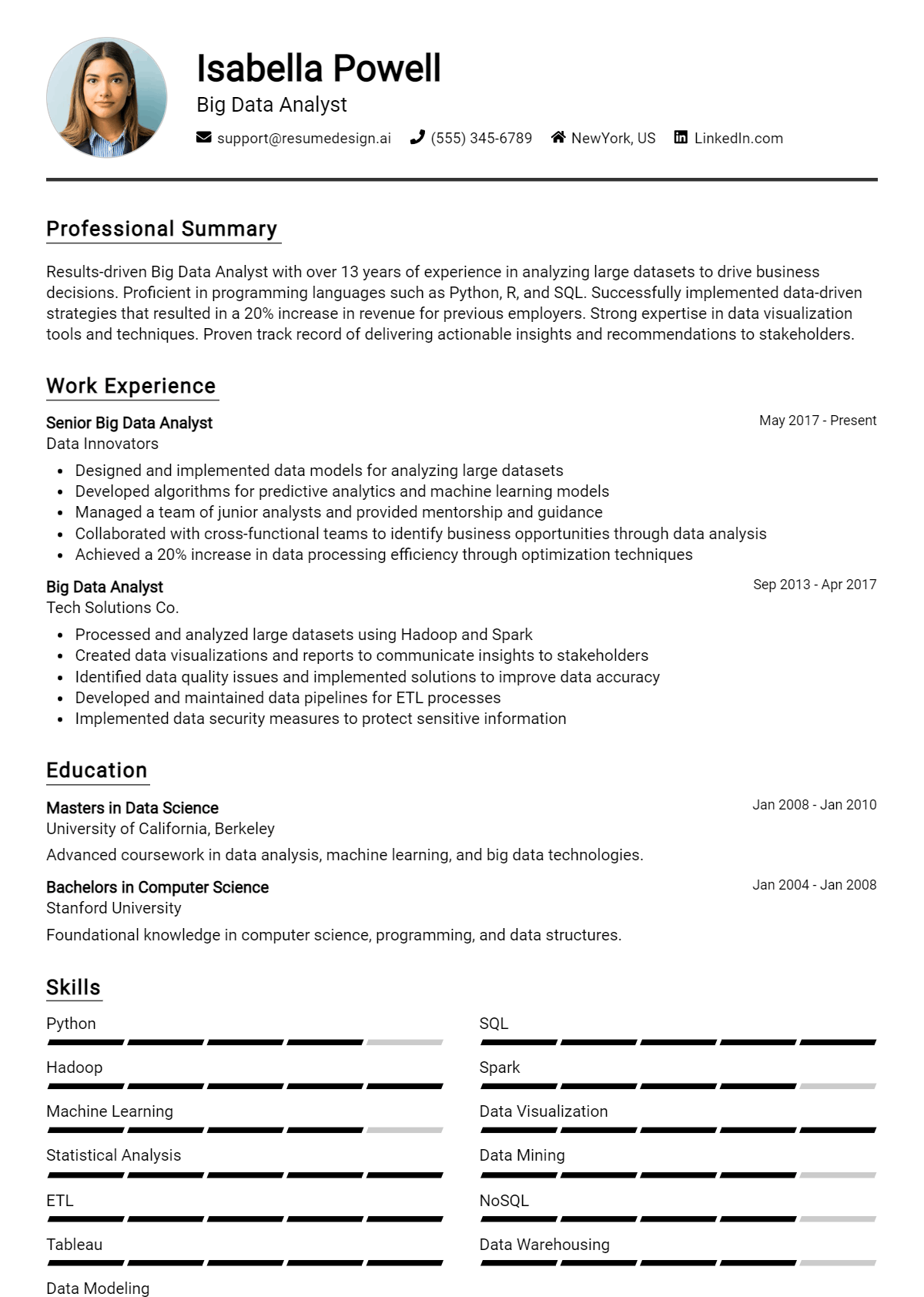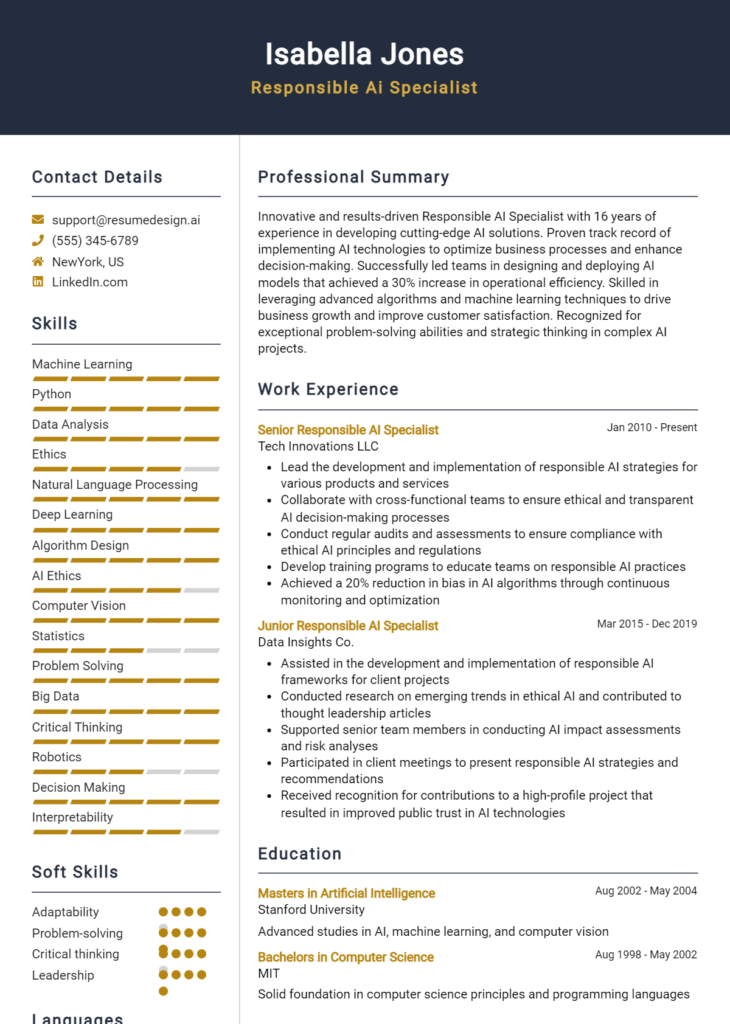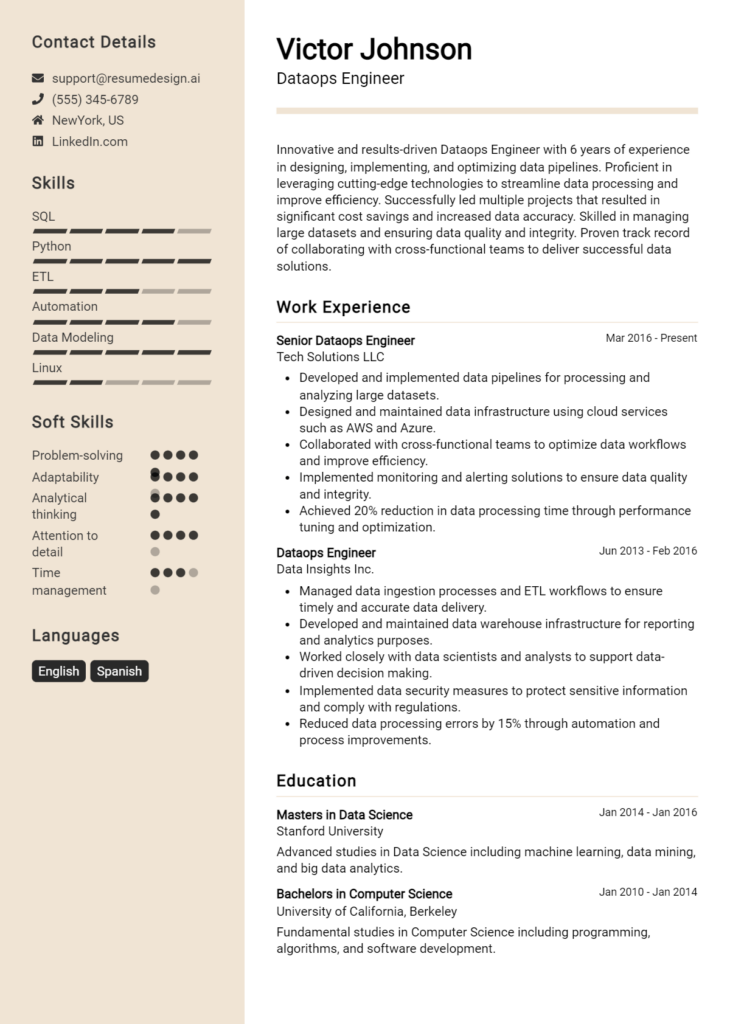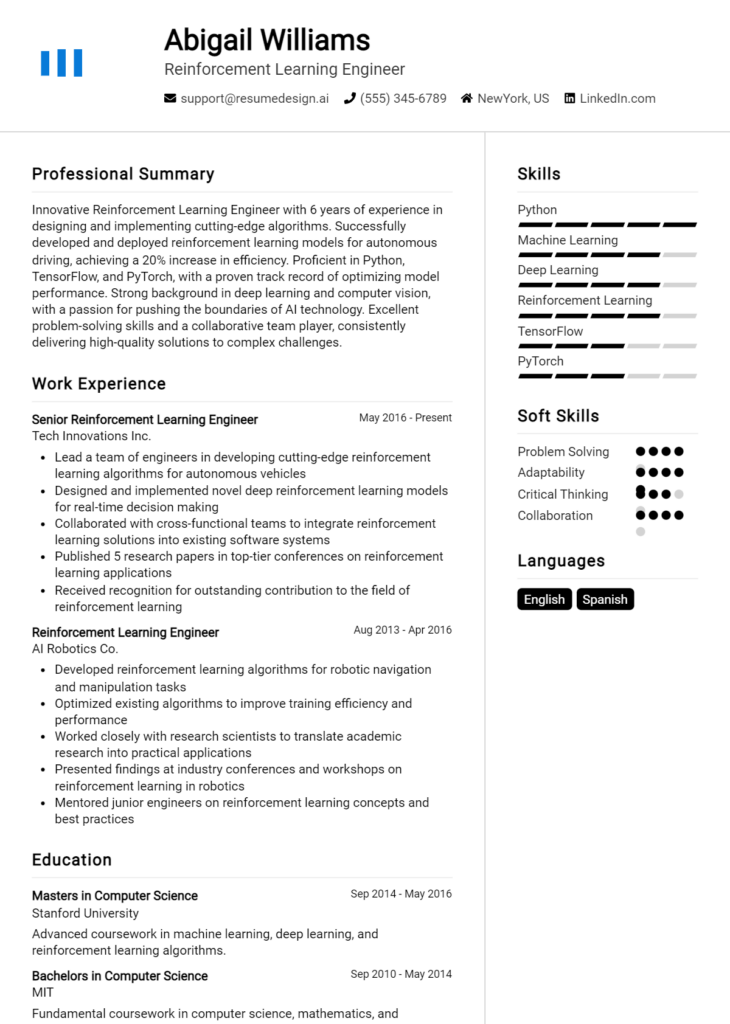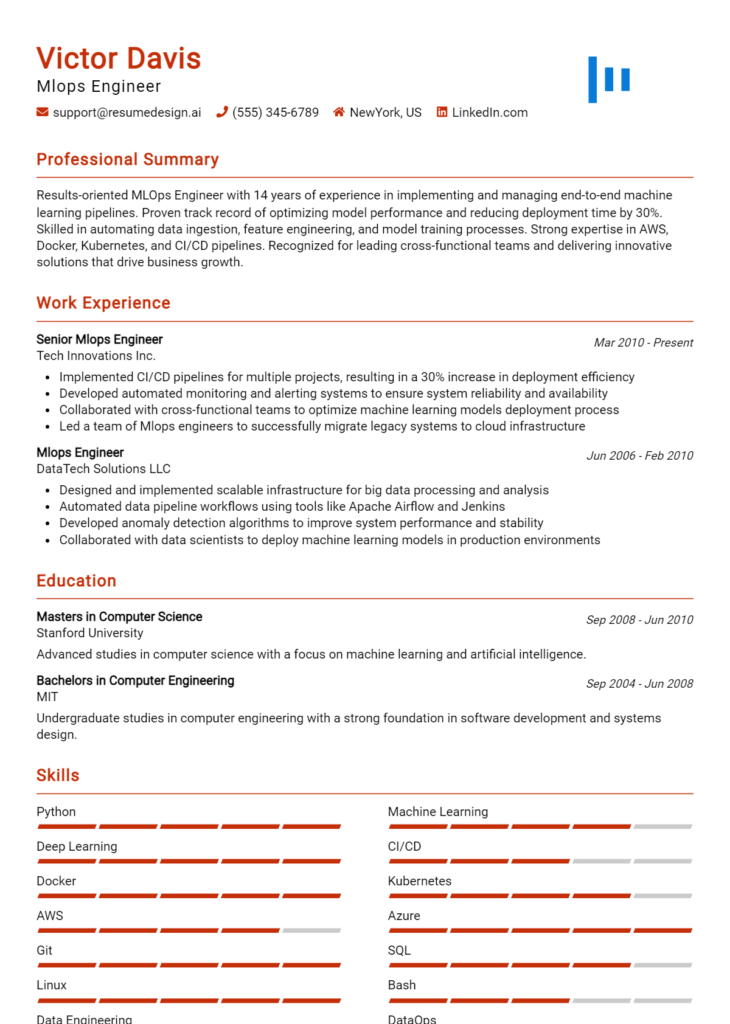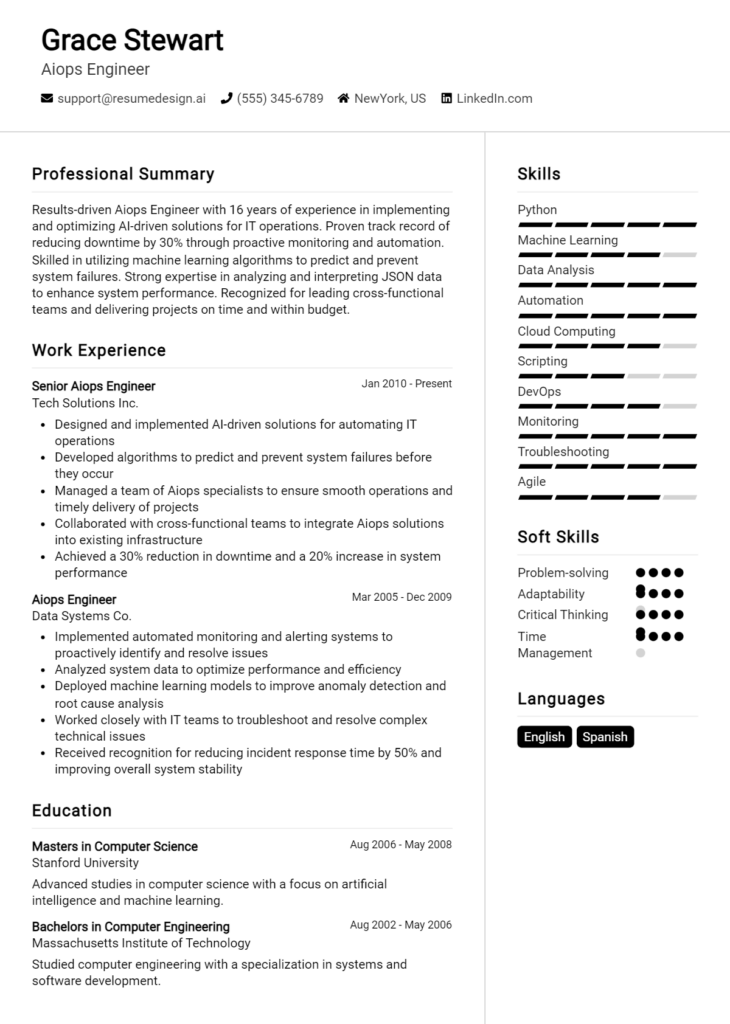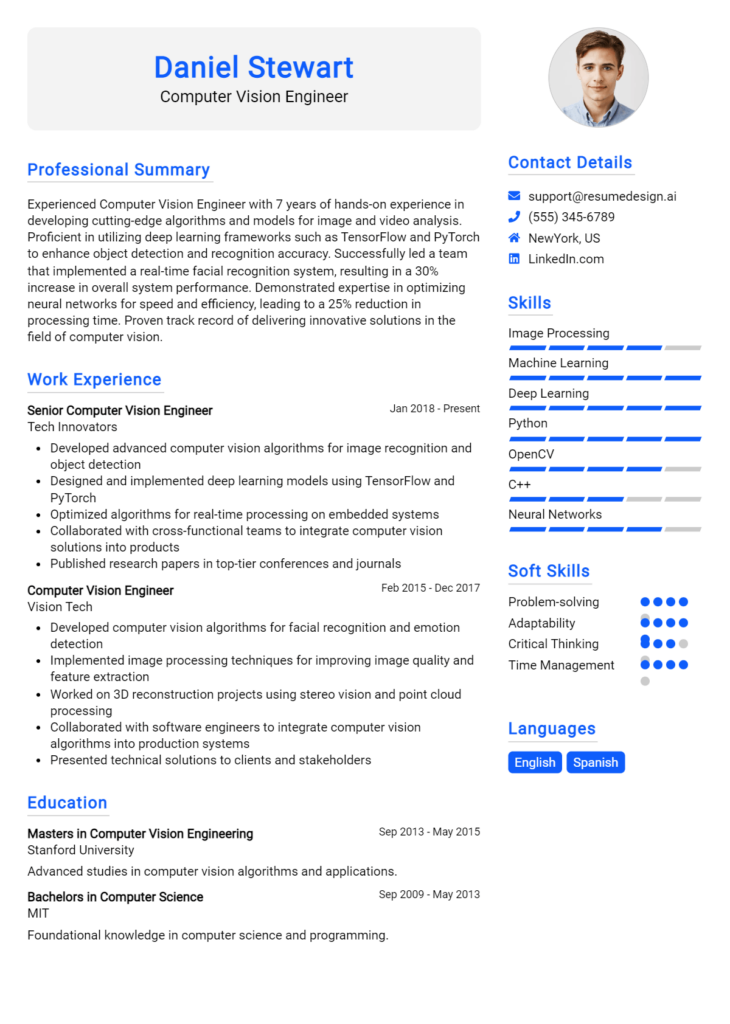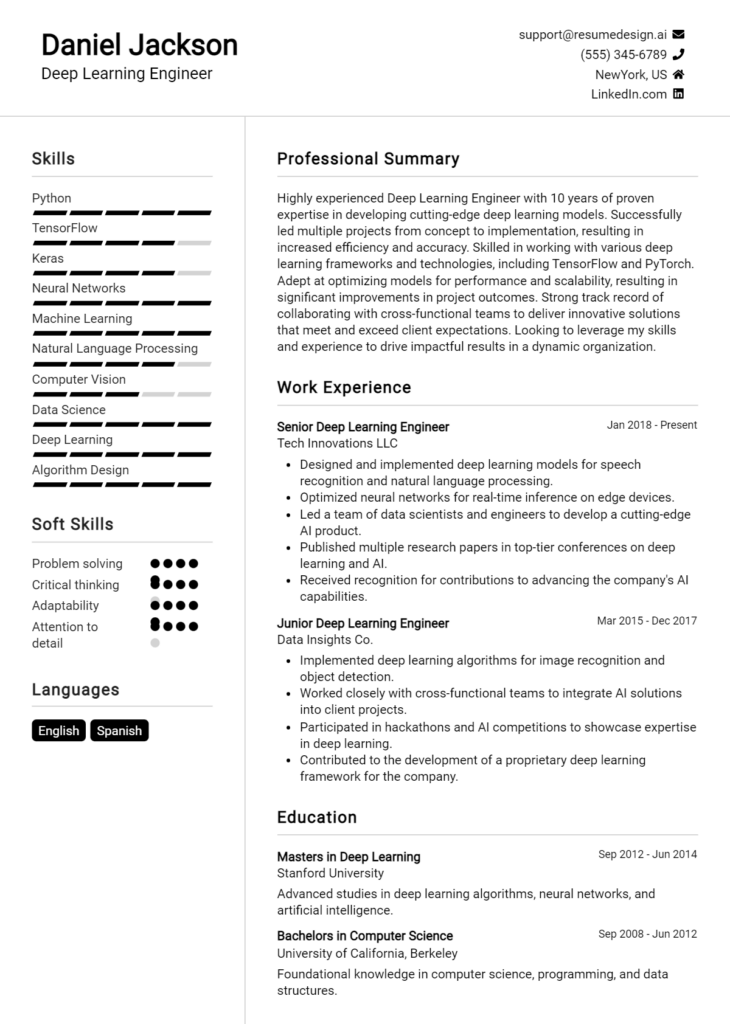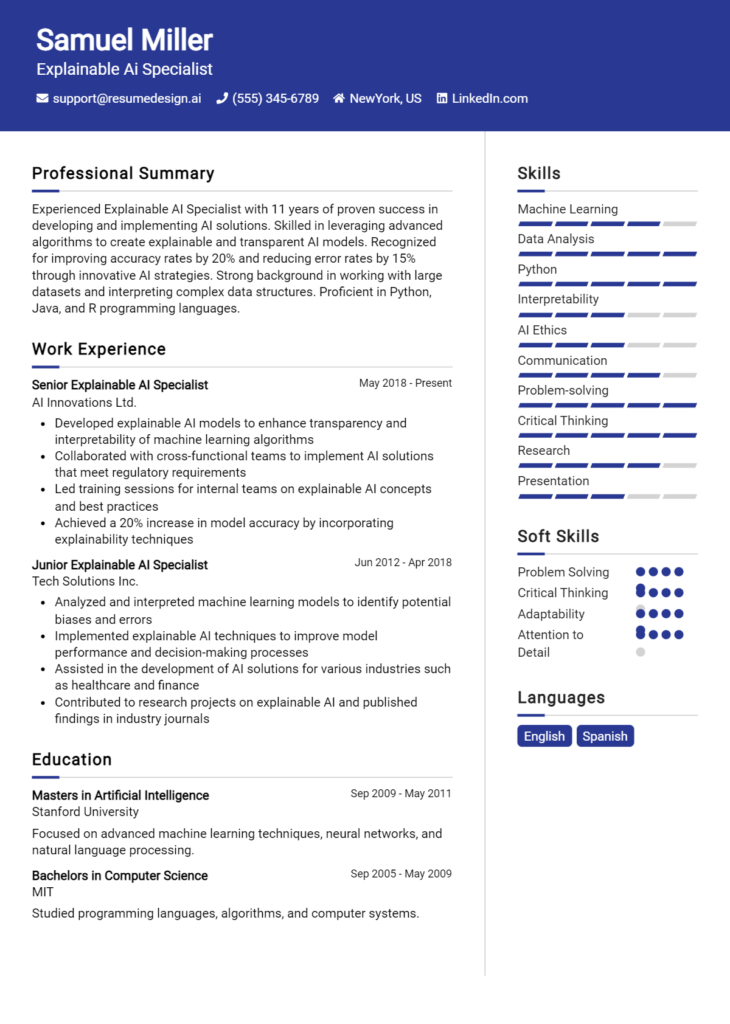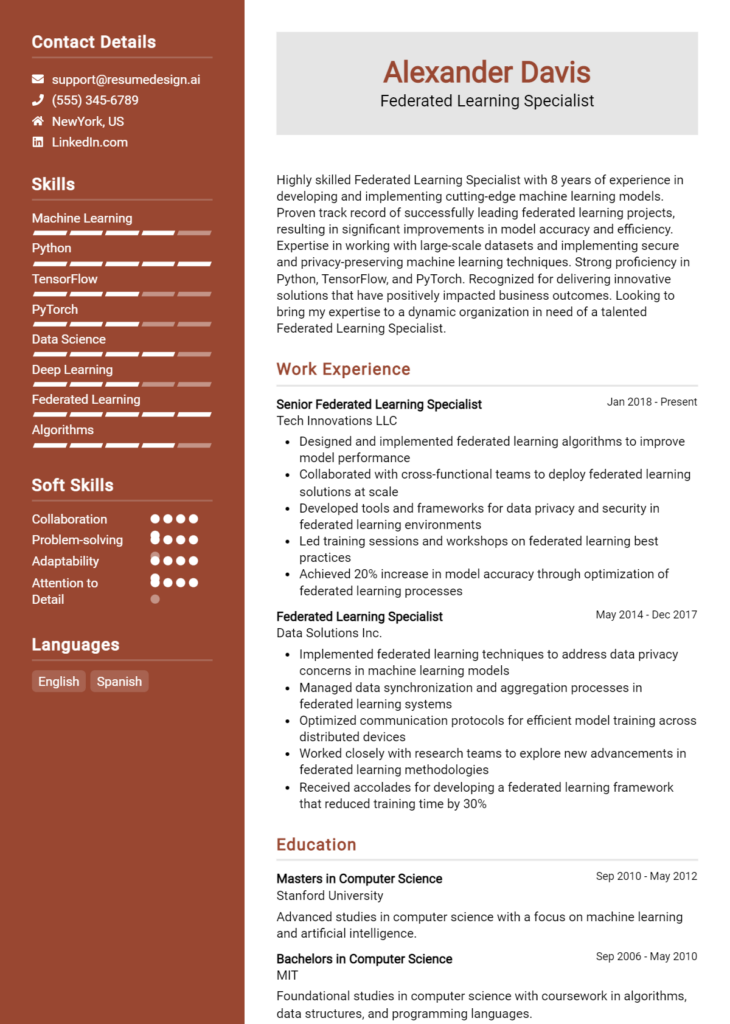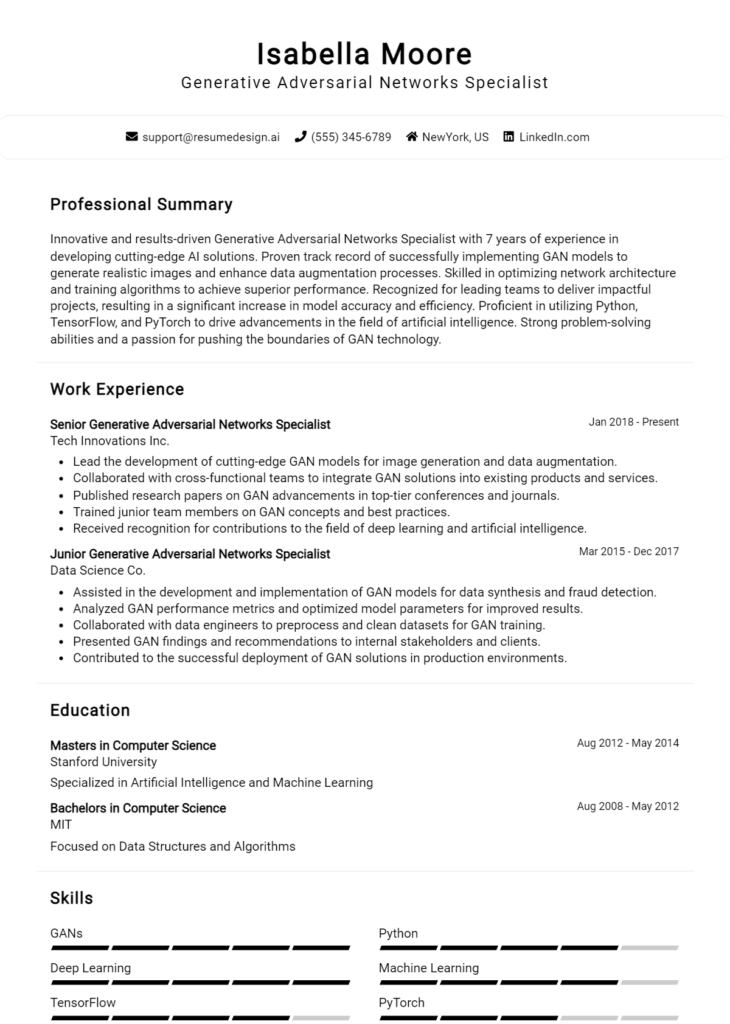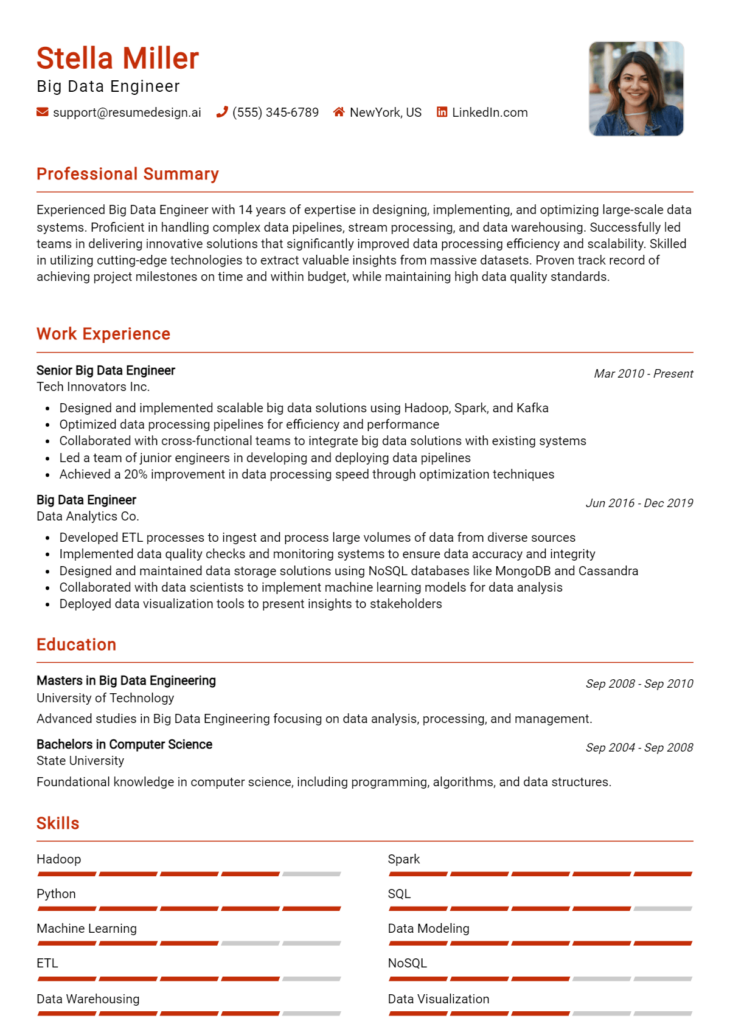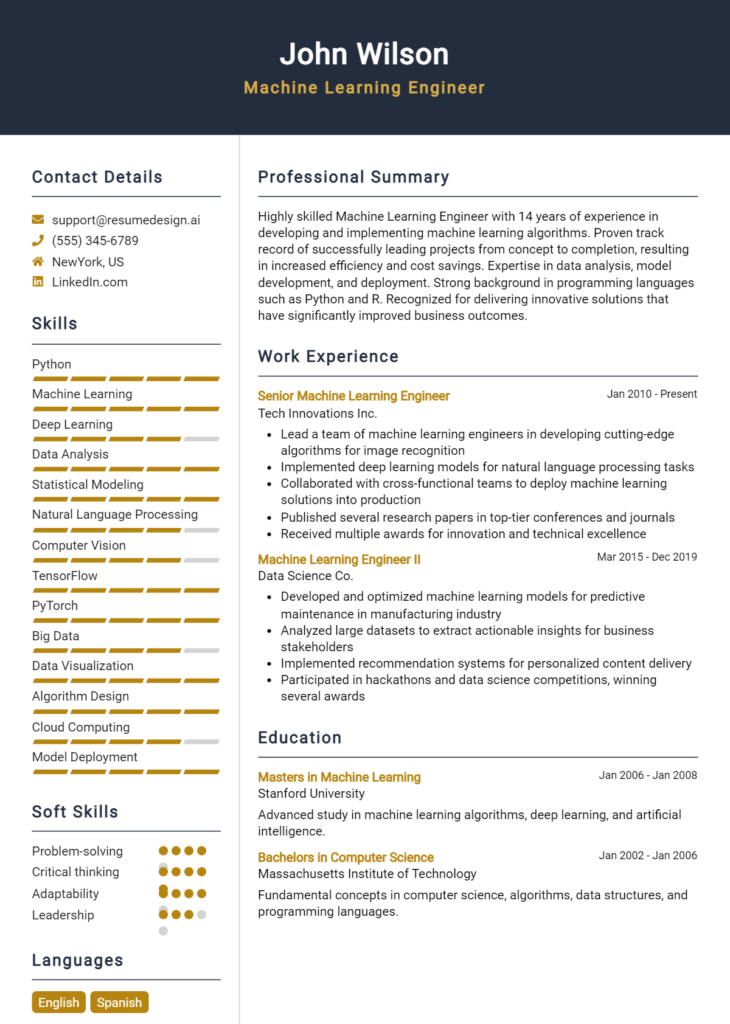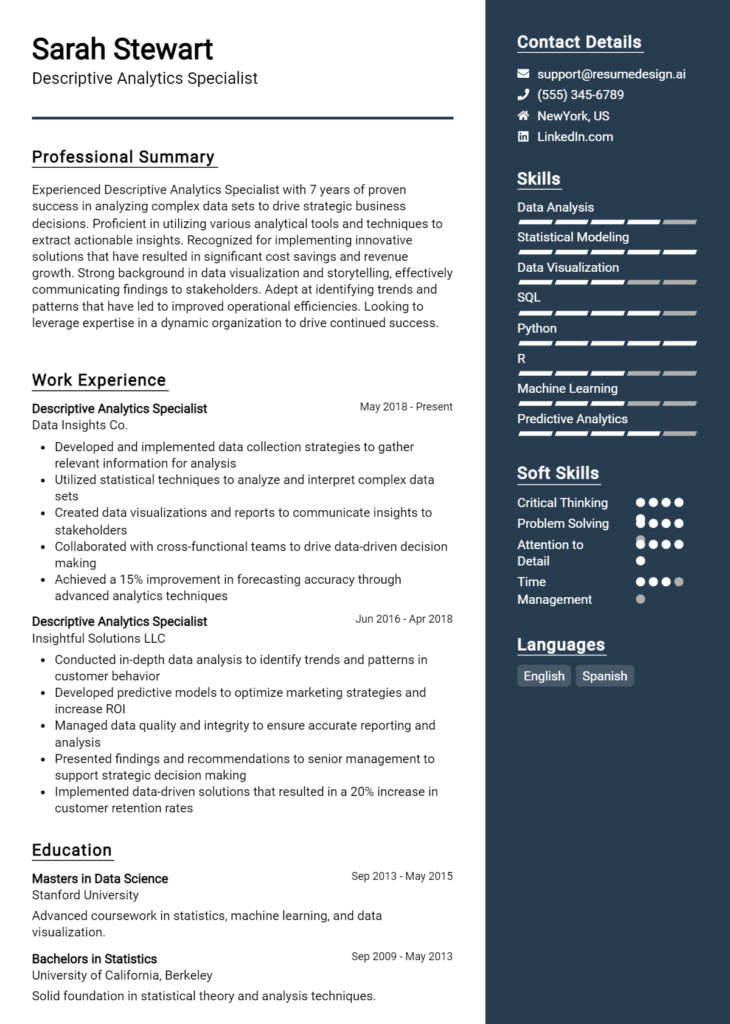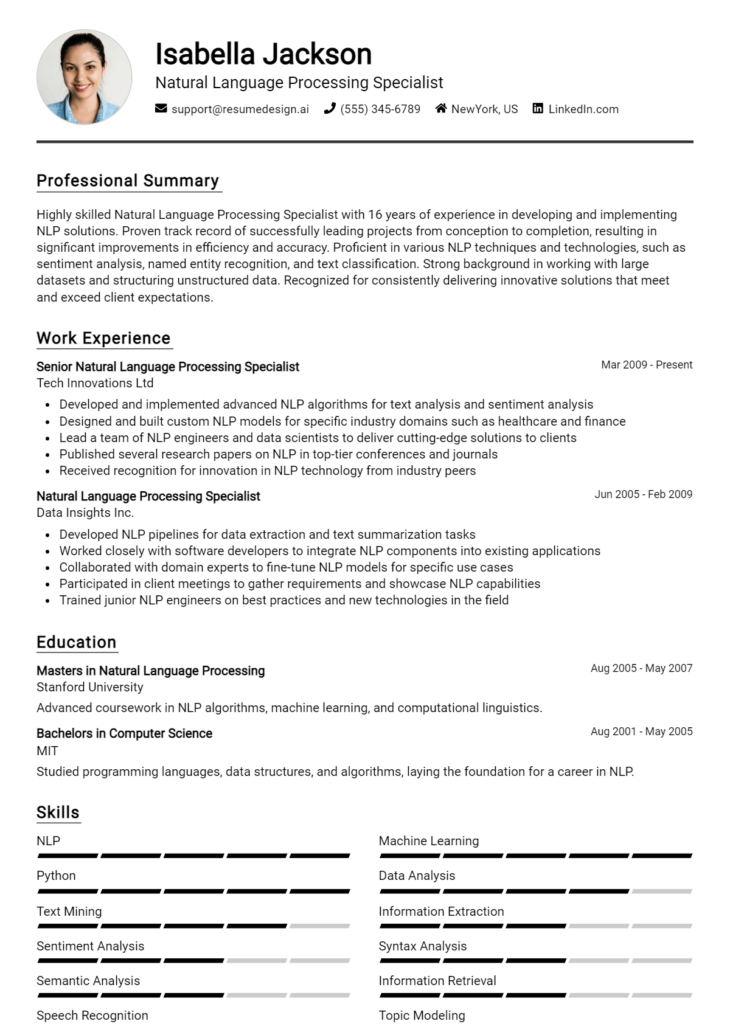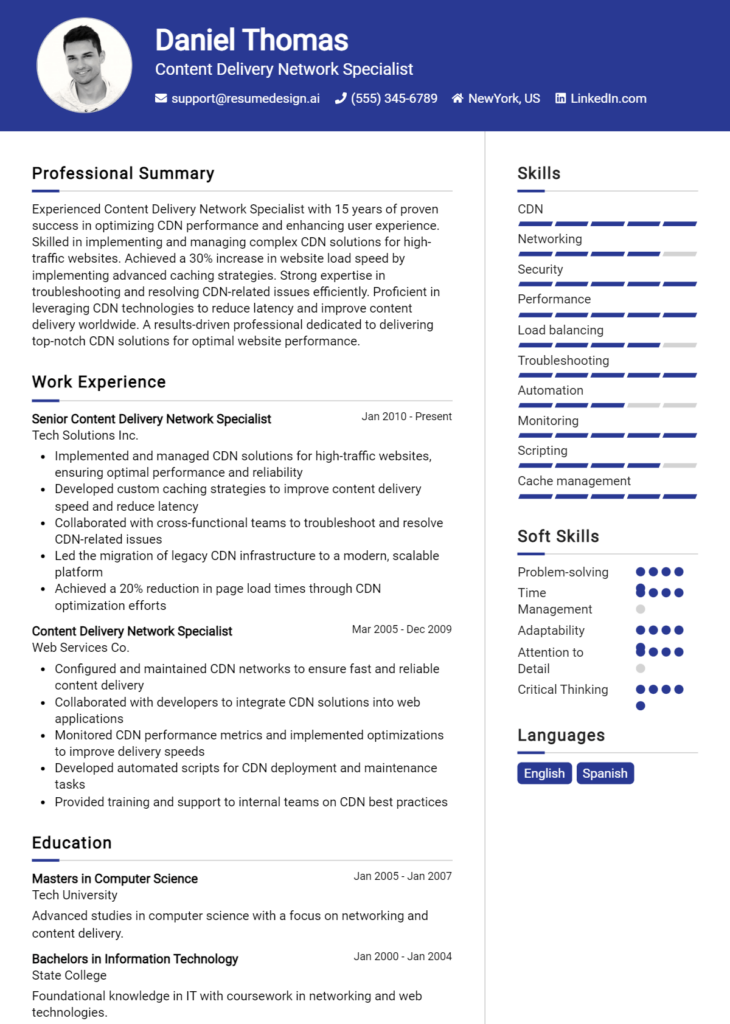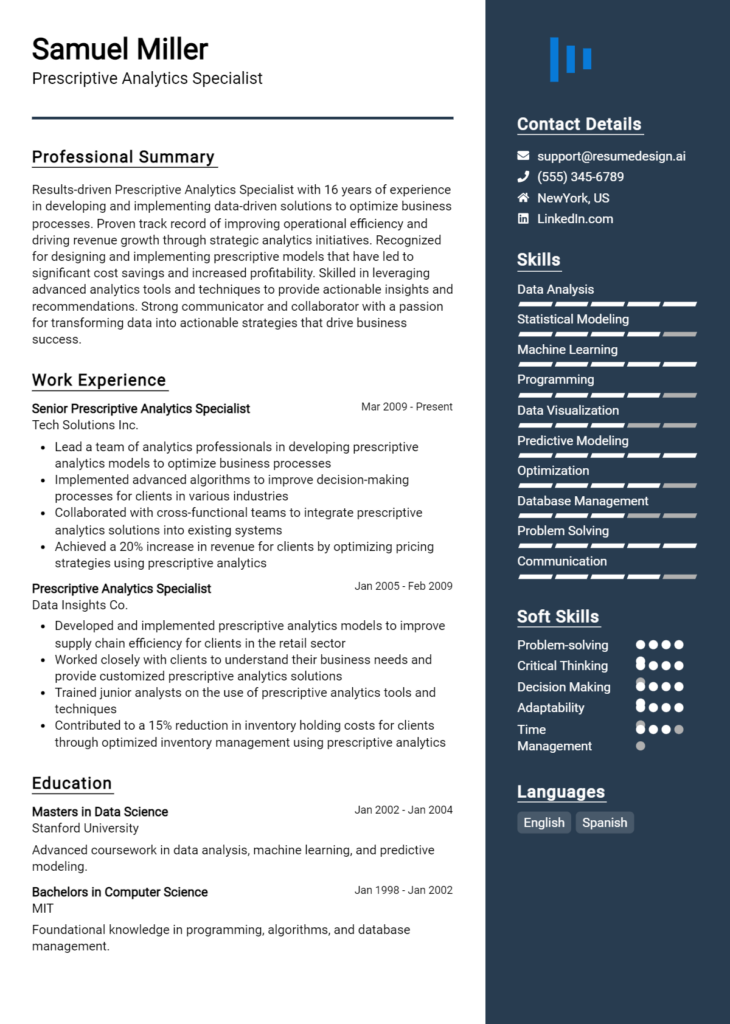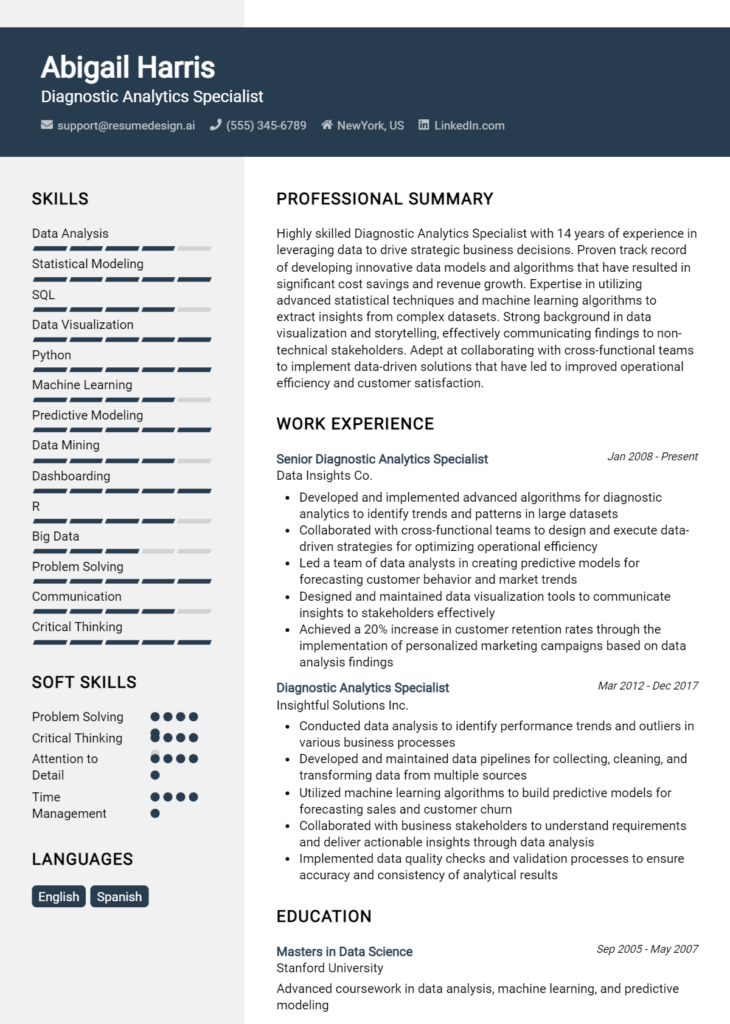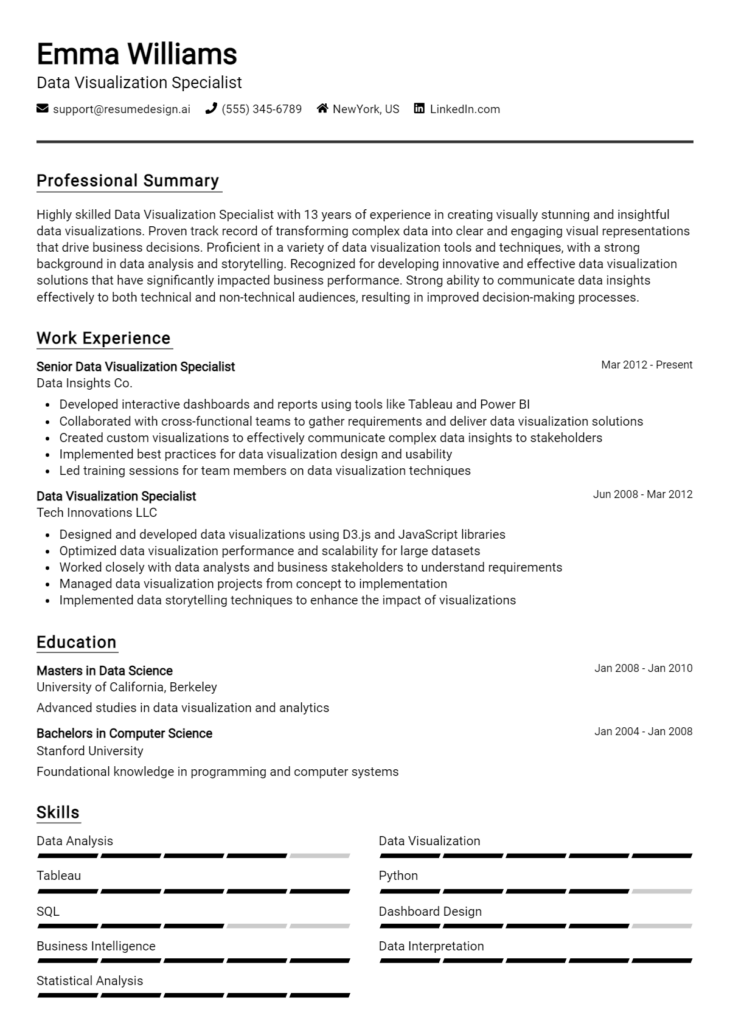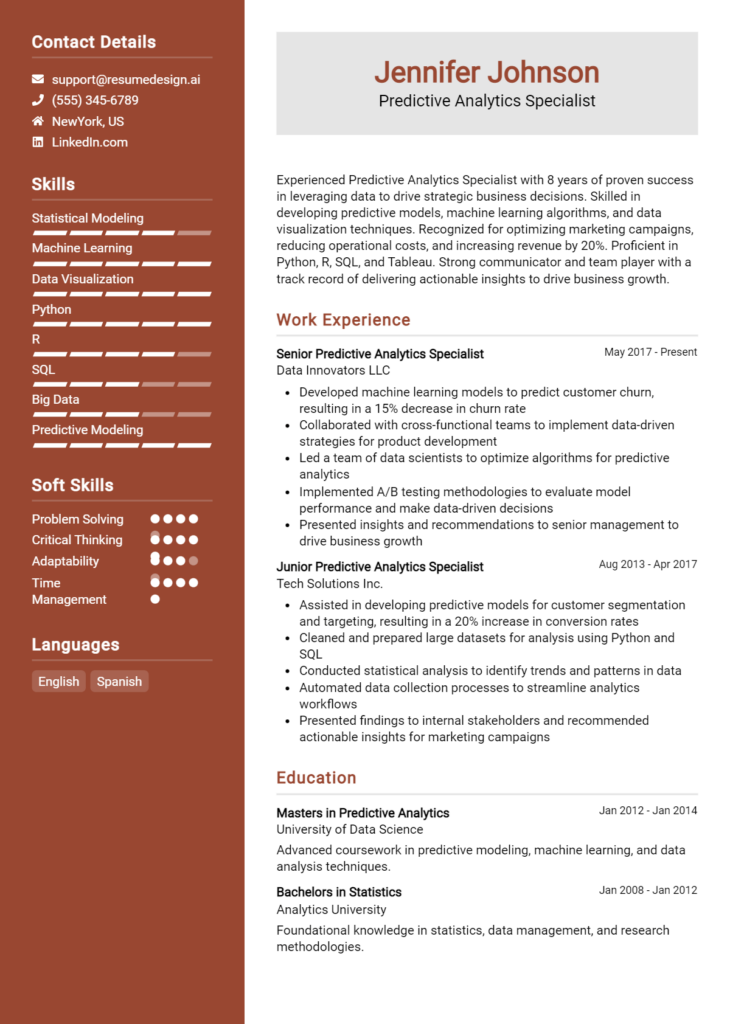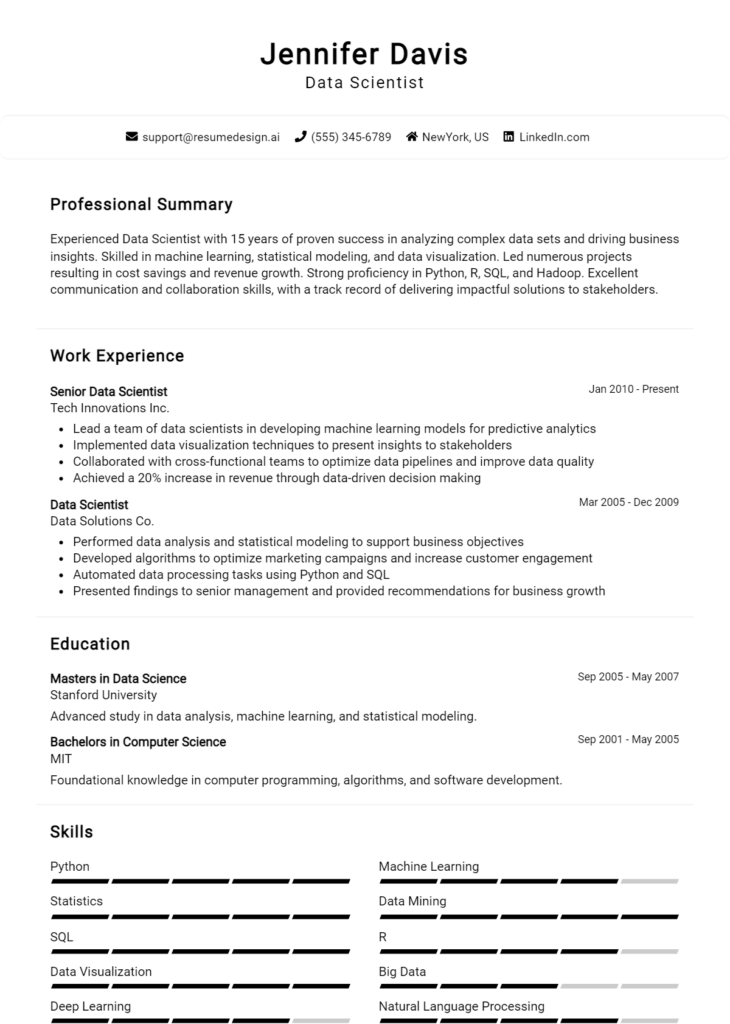Big Data Analyst Core Responsibilities
A Big Data Analyst plays a crucial role in transforming vast amounts of data into actionable insights that drive organizational success. They must possess strong technical skills in data mining, statistical analysis, and data visualization tools, along with operational expertise to bridge the gap between departments such as IT, marketing, and finance. Problem-solving abilities are essential for identifying trends and making data-driven recommendations. A well-structured resume effectively highlights these competencies, showcasing how they contribute to achieving the company’s strategic goals.
Common Responsibilities Listed on Big Data Analyst Resume
- Collect, process, and analyze large data sets from multiple sources.
- Develop and implement data models and algorithms to extract insights.
- Create visualizations and reports to communicate findings to stakeholders.
- Collaborate with cross-functional teams to identify business needs.
- Monitor data quality and ensure accuracy and integrity.
- Conduct statistical analyses to support decision-making processes.
- Utilize machine learning techniques to improve data predictions.
- Design and maintain databases for optimal data storage and retrieval.
- Stay updated on industry trends and emerging technologies.
- Provide training and support to team members on data tools and methodologies.
- Assist in developing data governance and compliance policies.
High-Level Resume Tips for Big Data Analyst Professionals
In today's competitive job market, a well-crafted resume serves as a crucial tool for Big Data Analyst professionals looking to make a strong first impression on potential employers. Your resume is often the first glimpse an employer has of your qualifications, skills, and achievements, making it imperative that it effectively showcases your expertise in data analysis, statistical methods, and the tools of the trade. A polished resume not only highlights your technical capabilities but also tells the story of your career progression and accomplishments in the field of big data. This guide will provide practical and actionable resume tips specifically tailored for Big Data Analyst professionals to help you stand out from the crowd.
Top Resume Tips for Big Data Analyst Professionals
- Tailor your resume to each job description by incorporating relevant keywords and phrases to demonstrate alignment with the role.
- Showcase your relevant experience in data analysis, including internships, projects, and previous job roles that highlight your analytical skills.
- Quantify your achievements with specific metrics or results, such as improvements in data processing efficiency or insights that led to revenue growth.
- Highlight industry-specific skills, such as expertise in Hadoop, Spark, SQL, and data visualization tools like Tableau or Power BI.
- Include a summary statement that captures your core competencies and value proposition as a Big Data Analyst.
- Utilize clear and concise formatting to ensure your resume is easy to read, using bullet points and headings effectively.
- Incorporate relevant certifications or courses that demonstrate your commitment to continuous learning in the field of big data.
- Showcase soft skills like problem-solving, communication, and teamwork, which are essential for collaborating with cross-functional teams.
- Make sure to proofread your resume for grammatical errors and typos, as attention to detail is crucial in data analysis roles.
By implementing these tips, you can significantly enhance your resume and increase your chances of landing a job in the Big Data Analyst field. A well-structured resume that effectively communicates your skills, achievements, and alignment with the job's requirements will set you apart from other candidates and open doors to exciting career opportunities.
Why Resume Headlines & Titles are Important for Big Data Analyst
In today's competitive job market, a Big Data Analyst's resume must stand out to capture the attention of hiring managers quickly. A well-crafted resume headline or title plays a crucial role in this process, serving as the first impression of a candidate's qualifications. A strong headline can succinctly summarize a candidate's key skills, experience, and value proposition in one impactful phrase, making it easier for recruiters to gauge their suitability for the role at a glance. It should be concise, relevant, and directly aligned with the position being applied for, ensuring that it resonates with the specific requirements of the job.
Best Practices for Crafting Resume Headlines for Big Data Analyst
- Keep it concise: Aim for one impactful sentence that encapsulates your value.
- Be role-specific: Tailor your headline to reflect the Big Data Analyst position you are applying for.
- Highlight key skills: Include the most relevant skills that align with the job description.
- Showcase accomplishments: If possible, mention a significant achievement or metric.
- Use industry keywords: Incorporate terms that are commonly used in the Big Data field.
- Avoid clichés: Steer clear of overused phrases like "hardworking" or "team player."
- Make it impactful: Use strong action words to create a sense of authority.
- Ensure clarity: Avoid jargon that may confuse hiring managers unfamiliar with specific technologies.
Example Resume Headlines for Big Data Analyst
Strong Resume Headlines
"Data-Driven Big Data Analyst with 5+ Years Experience in Machine Learning and Predictive Analytics"
“Results-Oriented Big Data Analyst Specializing in Data Visualization and Business Intelligence Solutions”
“Expert Big Data Analyst with Proven Track Record in Transforming Raw Data into Actionable Insights”
“Analytical Big Data Professional Skilled in Python, SQL, and Advanced Data Mining Techniques”
Weak Resume Headlines
“Looking for a Job in Data Analysis”
“Big Data Analyst with Various Skills”
The strong resume headlines are effective because they are specific, highlight essential skills and experiences, and showcase a clear value proposition that aligns with the job requirements. They provide hiring managers with immediate insight into what the candidate brings to the table, making it easier for them to decide whether to delve deeper into the resume. In contrast, the weak headlines fail to impress because they lack specificity, do not convey any unique qualifications, and do little to differentiate the candidate from the competition, ultimately missing the opportunity to capture the hiring manager's interest.
Writing an Exceptional Big Data Analyst Resume Summary
A well-crafted resume summary is crucial for a Big Data Analyst, as it serves as the first impression for hiring managers. In a competitive job market, a strong summary quickly captures attention by highlighting key skills, relevant experience, and significant accomplishments that align with the job role. It should be concise and impactful, tailored to reflect the specific requirements of the position being applied for. A compelling summary not only showcases the candidate's qualifications but also sets the tone for the rest of the resume, encouraging hiring managers to read further.
Best Practices for Writing a Big Data Analyst Resume Summary
- Quantify Achievements: Use numbers and metrics to demonstrate the impact of your work.
- Focus on Relevant Skills: Highlight technical skills and tools that are pertinent to the role, such as SQL, Python, or Hadoop.
- Tailor for the Job Description: Customize your summary to reflect the specific requirements and responsibilities mentioned in the job listing.
- Use Action Verbs: Start sentences with strong action verbs to convey confidence and proactivity.
- Keep it Concise: Aim for 2-4 sentences that deliver your message clearly without unnecessary fluff.
- Showcase Industry Knowledge: Include any relevant industry-specific knowledge or experience that can set you apart.
- Highlight Soft Skills: Mention key interpersonal skills, such as problem-solving and communication, which are essential for collaboration in data projects.
- Review and Revise: Always proofread your summary to eliminate errors and ensure clarity.
Example Big Data Analyst Resume Summaries
Strong Resume Summaries
Data-driven Big Data Analyst with over 5 years of experience in leveraging advanced analytics to drive business solutions. Successfully improved data processing efficiency by 30% through the implementation of optimized ETL processes.
Results-oriented analyst skilled in Python and SQL, with a track record of transforming complex datasets into actionable insights. Increased revenue by 15% for a leading retail client by developing predictive models that enhanced customer targeting.
Dedicated Big Data Analyst proficient in Hadoop and Spark, adept at managing large datasets and extracting valuable insights. Spearheaded a project that reduced operational costs by $200,000 annually through data-driven decision-making.
Weak Resume Summaries
Big Data Analyst with experience in data analysis and management. Looking for a position where I can utilize my skills.
Analyst with knowledge of data tools and technologies. Interested in working in a challenging environment.
The strong resume summaries are considered effective because they include specific metrics and accomplishments, clearly outline relevant skills, and demonstrate a direct connection to the role of a Big Data Analyst. In contrast, the weak summaries lack detail and quantifiable results, making them generic and less compelling to hiring managers. They fail to convey the candidate's unique value or how they can contribute to the company’s success.
Work Experience Section for Big Data Analyst Resume
The work experience section of a Big Data Analyst resume is vital as it provides potential employers with insights into a candidate's technical skills, project management abilities, and capacity to deliver high-quality products. This section not only highlights relevant experience but also serves as a platform for quantifying achievements, which can set a candidate apart in a competitive field. Aligning past roles and accomplishments with industry standards is crucial for demonstrating expertise and value to prospective employers.
Best Practices for Big Data Analyst Work Experience
- Use specific metrics to quantify your achievements, such as percentage improvements or revenue increases.
- Highlight technical skills relevant to Big Data, including tools and technologies like Hadoop, Spark, SQL, and Python.
- Emphasize leadership and teamwork experiences that demonstrate your ability to manage projects and collaborate effectively.
- Tailor your work experience to align with the job description and industry standards to showcase your suitability.
- Describe complex projects you’ve led or contributed to, focusing on your role and impact.
- Include certifications or training that bolster your technical credibility in the field of Big Data.
- Use action verbs to convey your contributions and achievements dynamically.
- Keep your descriptions concise and focused, ensuring clarity and impact in each statement.
Example Work Experiences for Big Data Analyst
Strong Experiences
- Led a team of data scientists to develop a predictive analytics model that increased customer retention by 20%, utilizing Python and machine learning algorithms.
- Designed and implemented a Big Data processing pipeline using Apache Spark, reducing data processing time by 50% and improving report generation efficiency.
- Collaborated with cross-functional teams to identify data-driven solutions, resulting in a 15% increase in sales through targeted marketing strategies based on customer insights.
- Managed a project involving the migration of legacy systems to a cloud-based infrastructure, improving data accessibility and reducing operational costs by 30%.
Weak Experiences
- Worked on data analysis tasks for various projects.
- Participated in team meetings to discuss data-related issues.
- Assisted in the implementation of data management solutions.
- Helped with reporting tasks when needed.
The strong experiences are considered effective because they highlight specific achievements, quantify results, and demonstrate leadership and collaboration in impactful projects. In contrast, the weak experiences lack detail and measurable outcomes, making them less impressive and failing to showcase the candidate's true capabilities in the Big Data domain.
Education and Certifications Section for Big Data Analyst Resume
The education and certifications section of a Big Data Analyst resume plays a crucial role in showcasing a candidate's academic foundations and ongoing professional development. This section not only highlights the educational credentials that are fundamental to the field but also emphasizes industry-relevant certifications and specialized training. By including pertinent coursework and recognized certifications, candidates can significantly bolster their credibility and demonstrate their commitment to continuous learning. A well-crafted education and certifications section can effectively align the candidate's qualifications with the requirements of the job role, making them a more attractive prospect to potential employers.
Best Practices for Big Data Analyst Education and Certifications
- Prioritize relevant degrees, such as those in Data Science, Statistics, or Computer Science.
- Include certifications from reputable organizations, such as AWS Certified Data Analytics or Cloudera Certified Associate (CCA).
- Be specific about coursework that directly relates to big data technologies and methodologies.
- List ongoing education or training programs that demonstrate a commitment to staying current in the field.
- Highlight any honors or distinctions received during your studies to stand out from other candidates.
- Use clear and concise language to convey your qualifications, avoiding jargon that may obscure your credentials.
- Include dates of graduation and completion for clarity on your educational timeline.
- Consider the layout and organization to enhance readability and ensure key information stands out.
Example Education and Certifications for Big Data Analyst
Strong Examples
- M.S. in Data Science, University of XYZ, Graduated May 2022
- AWS Certified Data Analytics – Specialty, Certification obtained August 2023
- Coursework: Big Data Technologies, Machine Learning, and Data Visualization Techniques
- Certified Analytics Professional (CAP), Certification obtained January 2023
Weak Examples
- B.A. in Philosophy, University of ABC, Graduated May 2010
- Online Course in Basic Excel, Completed June 2021
- Certification in Microsoft Office Suite, Obtained December 2019
- High School Diploma, Graduated June 2006
The strong examples provided are considered robust because they include relevant degrees, recognized certifications, and coursework that directly applies to big data analytics. They reflect a candidate's preparedness for the role and their dedication to acquiring specialized knowledge in the field. Conversely, the weak examples illustrate qualifications that lack relevance to a Big Data Analyst position, such as degrees in unrelated fields and certifications that do not enhance the candidate's profile in data analytics. These examples highlight the importance of aligning educational background with industry expectations to improve job market competitiveness.
Top Skills & Keywords for Big Data Analyst Resume
In the competitive field of data analytics, crafting a compelling resume is essential for standing out to potential employers. A Big Data Analyst's resume should highlight a blend of both hard and soft skills that showcase analytical prowess and the ability to communicate insights effectively. Employers are increasingly looking for candidates who not only possess technical expertise but also demonstrate critical thinking, problem-solving, and collaboration skills. By emphasizing these skills, a candidate can effectively convey their value and readiness to tackle complex data challenges.
Top Hard & Soft Skills for Big Data Analyst
Soft Skills
- Analytical Thinking
- Problem-Solving
- Communication Skills
- Team Collaboration
- Attention to Detail
- Adaptability
- Time Management
- Critical Thinking
- Creativity
- Business Acumen
Hard Skills
- Data Mining
- SQL and Database Management
- Statistical Analysis
- Machine Learning
- Data Visualization Tools (e.g., Tableau, Power BI)
- Programming Languages (e.g., Python, R)
- Big Data Technologies (e.g., Hadoop, Spark)
- Data Warehousing
- ETL (Extract, Transform, Load) Processes
- Cloud Computing (e.g., AWS, Azure)
For more insights on the importance of skills in your resume and how to effectively showcase your work experience, consider exploring the links provided.
Stand Out with a Winning Big Data Analyst Cover Letter
Dear Hiring Manager,
I am writing to express my interest in the Big Data Analyst position at [Company Name] as advertised on [Job Board/Company Website]. With a strong background in data analysis, statistical modeling, and a passion for transforming complex datasets into actionable insights, I am excited about the opportunity to contribute to your team. My expertise in tools such as Hadoop, Spark, and SQL, coupled with my proficiency in Python and R, has equipped me with the necessary skills to tackle large-scale data challenges effectively.
In my previous role at [Previous Company Name], I successfully led a project that involved analyzing customer behavior patterns using big data technologies. By employing advanced analytical techniques and machine learning algorithms, I was able to uncover trends that directly informed marketing strategies, resulting in a 20% increase in customer engagement within six months. My ability to communicate complex findings to non-technical stakeholders has been pivotal in driving data-driven decisions across departments.
I am particularly drawn to [Company Name] because of your commitment to leveraging data for innovation and growth. I am eager to bring my analytical skills and collaborative spirit to your team, contributing to the development of solutions that enhance operational efficiency and improve customer experiences. I am confident that my background and passion for data analytics make me a strong candidate for this role.
Thank you for considering my application. I look forward to the possibility of discussing how my skills and experiences align with the goals of [Company Name]. I am excited about the opportunity to contribute to your team and help drive success through data-driven insights.
Sincerely,
[Your Name]
[Your LinkedIn Profile or Contact Information]
Common Mistakes to Avoid in a Big Data Analyst Resume
When crafting a resume for a Big Data Analyst position, it's crucial to present your skills and experiences effectively to stand out in a competitive job market. However, many candidates make common mistakes that can detract from their qualifications. Avoiding these pitfalls can significantly enhance your chances of landing an interview. Here are some common mistakes to watch out for:
Lack of Specificity: Failing to include specific tools and technologies used can make your resume less compelling. Be sure to mention platforms like Hadoop, Spark, or SQL to demonstrate your technical proficiency.
Overly Generic Objective Statements: Using a vague objective statement that doesn't align with the job can signal a lack of focus. Tailor your objective to reflect your goals related to the specific role and company.
Ignoring Quantifiable Achievements: Simply listing duties rather than achievements can weaken your impact. Use numbers and metrics to showcase how your contributions improved processes or outcomes.
Inconsistent Formatting: A cluttered or inconsistent format can make your resume hard to read. Stick to a clear, professional layout with uniform font styles and sizes for a polished appearance.
Neglecting Soft Skills: While technical skills are paramount, overlooking soft skills like communication and teamwork can be a mistake. Highlight how you’ve collaborated with cross-functional teams or presented data insights effectively.
Including Irrelevant Information: Adding unrelated work experience or outdated skills can dilute your resume's effectiveness. Focus on experiences that directly relate to big data analytics.
Failing to Customize for Each Application: Sending the same resume for multiple applications can be detrimental. Tailor your resume for each job by emphasizing the most relevant skills and experiences for the specific position.
Using Jargon Without Explanation: Including technical jargon without context can confuse hiring managers. Ensure that terms are explained or used in a way that demonstrates your understanding while remaining accessible.
Conclusion
As a Big Data Analyst, you play a crucial role in interpreting complex data sets and translating them into actionable insights that drive business decisions. Throughout your career, you'll need to showcase your analytical skills, proficiency in data processing tools, and ability to communicate findings effectively. Highlighting your experience with technologies such as Hadoop, SQL, and machine learning algorithms is essential. Additionally, demonstrating your understanding of data visualization tools can set you apart from other candidates.
To stay competitive in the job market, it’s important to regularly update your resume to reflect your latest skills and accomplishments. Take the time to review your Big Data Analyst resume and ensure it resonates with potential employers. Consider using specialized resources to enhance your application materials:
- Check out resume templates that can help you create a professional and visually appealing resume.
- Use the resume builder to streamline the process and ensure your resume is formatted correctly.
- Explore resume examples to gain inspiration and understand what hiring managers are looking for.
- Don’t forget to craft a compelling introduction with the help of cover letter templates that complement your resume.
Take action today to refine your resume and position yourself for success in your Big Data Analyst career!

